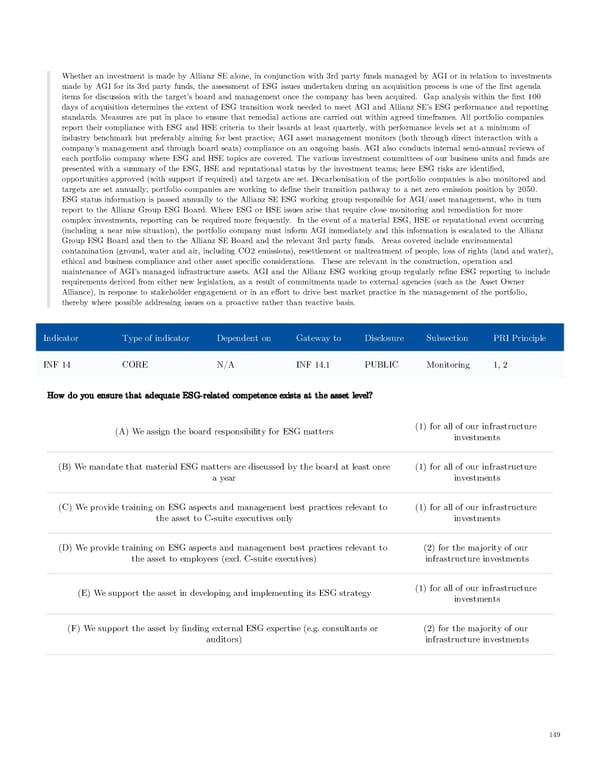Whether an investment is made by Allianz SE alone, in conjunction with 3rd party funds managed by AGI or in relation to investments made by AGI for its 3rd party funds, the assessment of ESG issues undertaken during an acquisition process is one of the first agenda items for discussion with the target’s board and management once the company has been acquired. Gap analysis within the first 100 days of acquisition determines the extent of ESG transition work needed to meet AGI and Allianz SE’s ESG performance and reporting standards. Measures are put in place to ensure that remedial actions are carried out within agreed timeframes. All portfolio companies report their compliance with ESG and HSE criteria to their boards at least quarterly, with performance levels set at a minimum of industry benchmark but preferably aiming for best practice; AGI asset management monitors (both through direct interaction with a company’s management and through board seats) compliance on an ongoing basis. AGI also conducts internal semi-annual reviews of each portfolio company where ESG and HSE topics are covered. The various investment committees of our business units and funds are presented with a summary of the ESG, HSE and reputational status by the investment teams; here ESG risks are identified, opportunities approved (with support if required) and targets are set. Decarbonisation of the portfolio companies is also monitored and targets are set annually; portfolio companies are working to define their transition pathway to a net zero emission position by 2050. ESG status information is passed annually to the Allianz SE ESG working group responsible for AGI/asset management, who in turn report to the Allianz Group ESG Board. Where ESG or HSE issues arise that require close monitoring and remediation for more complex investments, reporting can be required more frequently. In the event of a material ESG, HSE or reputational event occurring (including a near miss situation), the portfolio company must inform AGI immediately and this information is escalated to the Allianz Group ESG Board and then to the Allianz SE Board and the relevant 3rd party funds. Areas covered include environmental contamination (ground, water and air, including CO2 emissions), resettlement or maltreatment of people, loss of rights (land and water), ethical and business compliance and other asset specific considerations. These are relevant in the construction, operation and maintenance of AGI’s managed infrastructure assets. AGI and the Allianz ESG working group regularly refine ESG reporting to include requirements derived from either new legislation, as a result of commitments made to external agencies (such as the Asset Owner Alliance), in response to stakeholder engagement or in an effort to drive best market practice in the management of the portfolio, thereby where possible addressing issues on a proactive rather than reactive basis. Indicator Type of indicator Dependent on Gateway to Disclosure Subsection PRI Principle INF 14 CORE N/A INF 14.1 PUBLIC Monitoring 1, 2 How do you ensure that adequate ESG-related competence exists at the asset level? (1) for all of our infrastructure (A) We assign the board responsibility for ESG matters investments (B) We mandate that material ESG matters are discussed by the board at least once (1) for all of our infrastructure a year investments (C) We provide training on ESG aspects and management best practices relevant to (1) for all of our infrastructure the asset to C-suite executives only investments (D) We provide training on ESG aspects and management best practices relevant to (2) for the majority of our the asset to employees (excl. C-suite executives) infrastructure investments (1) for all of our infrastructure (E) We support the asset in developing and implementing its ESG strategy investments (F) We support the asset by finding external ESG expertise (e.g. consultants or (2) for the majority of our auditors) infrastructure investments 149
 AGI Public RI Report Page 148 Page 150
AGI Public RI Report Page 148 Page 150